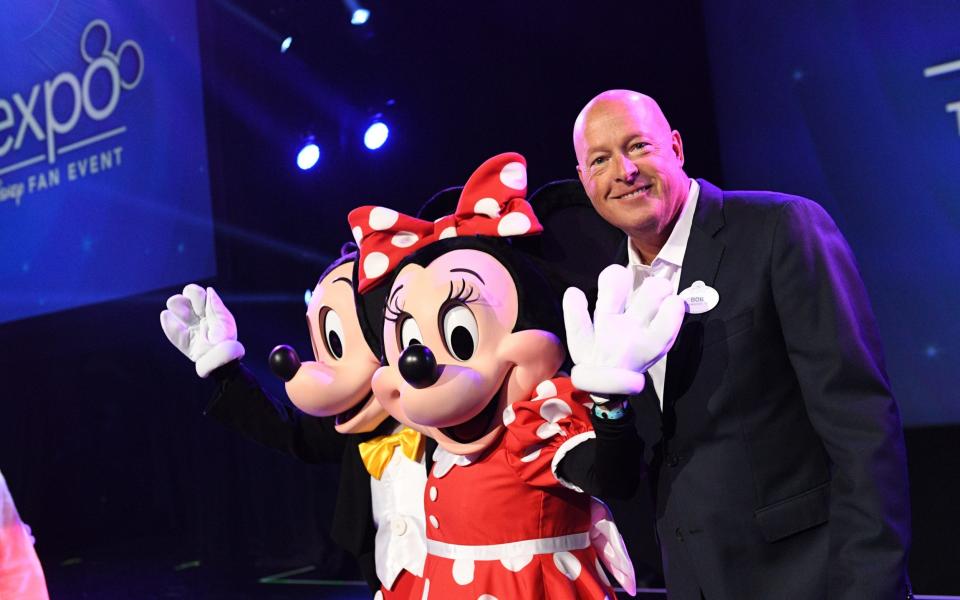Bruising encounter with culture wars puts Disney boss centre stage

Bob Chapek knew he was taking on a challenge worthy of any Marvel superhero when he was made Walt Disney’s chief executive.
Chapek, the little-known head of the entertainment giant’s parks and travel business, was succeeding Bob Iger, the boss of 15 years who had steered Disney through a series of transformational acquisitions including Pixar in 2006 and 21st Century Fox in 2019.
In February 2020, Chapek becoming only the seventh chief executive in the company’s 97-year-old history, a line that included corporate legends such as Michael Eisner, Donn Tatum and Roy Disney, Walt’s older brother.
On Tuesday, Disney’s board threw its weight behind Chapek and renewed a contract that had eight more months, by three years, despite a damaging row over his handling of Florida’s so-called “Don’t Say Gay” bill.
The embattled boss is now tasked with steering the entertainment behemoth through the double challenge of the US culture war and a squeeze on demand for online video.
Chapek’s ascendance had been a surprise. Kevin Mayer, the charismatic head of Disney’s streaming business, was overlooked and left the company shortly after. Iger had abruptly stepped down as chief executive in February 2020.
The 61-year-old kept a low profile building a career in areas such as home video before running the parks division. He did not possess the magic touch of Iger or Eisner, who were at home in Hollywood leading Disney’s creative endeavours.
Though Iger promised to stay on as executive chairman to ensure a smooth transition, Chapek's early weeks were anything but smooth. The pandemic shut down the cruises, theme parks and movie theatres that collectively accounted for the majority of Disney’s sales, and the cancellation of live sports hit its ESPN business.
In his first set of financial results, Disney’s profits dropped by 90pc and in his second, posted its first loss in two decades. The company cut tens of thousands of jobs for its theme parks’ “cast members”.
Yet when Disney’s board met this week to discuss Chapek’s future, it was the company’s actions after the pandemic that raised the biggest questions. Its parks may be full to the brim again — and cruise ships no longer docked — but Disney has been a magnet for controversy inconsistent with its fairytale branding in recent months.
Chapek has been under fire for its handling of a controversial law in Florida, the home of its Disney World theme park, rows with actress Scarlett Johansson and the slowing growth of streaming service Disney Plus.
“Disney was dealt a tough hand by the pandemic, yet with Bob at the helm, our businesses — from parks to streaming — not only weathered the storm but emerged in a position of strength,” chairman Susan Arnold said on Tuesday.
Chapek’s future would not have been in question 18 months ago. In November 2019, the company launched Disney Plus, its answer to Netflix, with a goal of reaching 60-90m subscribers within five years. It blew through that target in one year, and upped the goal to between 230m and 260m.
In what was taken as a sign of flexibility, it committed to releasing many of its new movies directly to streamers. Shares hit a record high in March 2021, even as its California and Paris theme parks remained shut.
The company had railed against lockdowns in liberal California, which contrasted with the enthusiastic reopening of Disney World in Republican-led Florida in mid-2020.
But the latter has posed a bigger problem in recent months. Disney and Chapek have drawn fire from investors, campaigners and employees for failing to public oppose Florida legislation dubbed “Don’t Say Gay”, which blocks schools from teaching young pupils about sexual orientation.
Chapek did not criticise the law until it had been passed, and later apologised for not coming out against it more forcefully. As one of the state’s biggest employers and a major donor, critics say Disney could have been more outspoken. Its belated stance has led politicians to revoke the company’s special tax privileges.
Meanwhile, the streaming revolution is losing pace. Disney was sued by Johansson last year over the decision to release her Marvel film Black Widow while it remained in cinemas, ultimately settling with the star.
Chapek may have decided the settlement was worth it, given Disney Plus’ momentum, but growth cratered soon after. Just 34m have signed up in the last 12 months, compared to 46.1m the previous year. Many of those are in India where growth has been supported by cut-price subscriptions, rather than the West where consumers face an array of services.
“It’s getting pretty congested,” says Neil Campling of Mirabaud Equity Research. “The most important thing for Disney is to keep momentum going on streaming.”
While Iger’s tenure was defined by major acquisitions of Pixar, Lucasfilm, Marvel and Fox, analysts at LightShed research say it is still unclear what Chapek’s vision is.
“The only question is does a Chapek-led Disney have the vision and deal-making prowess to take advantage of the opportunities that have been created [by the recent economic downturn]?” they wrote last month.
For now, Chapek has few obvious replacements. He recently fired top TV executive Peter Rice, one of the most powerful Brits in Hollywood who criticised the Florida law more openly than his boss. Sheryl Sandberg, a former Disney board member, has recently quit Facebook, but is unlikely to take up a new job so soon.
With shares having fallen by half since their peak last year, Chapek will be feeling the pressure. Recent controversies have forced him into the spotlight as much as Disney’s own colourful characters. Fixing things will require Chapek to summon some star power.

 Yahoo Finance
Yahoo Finance 